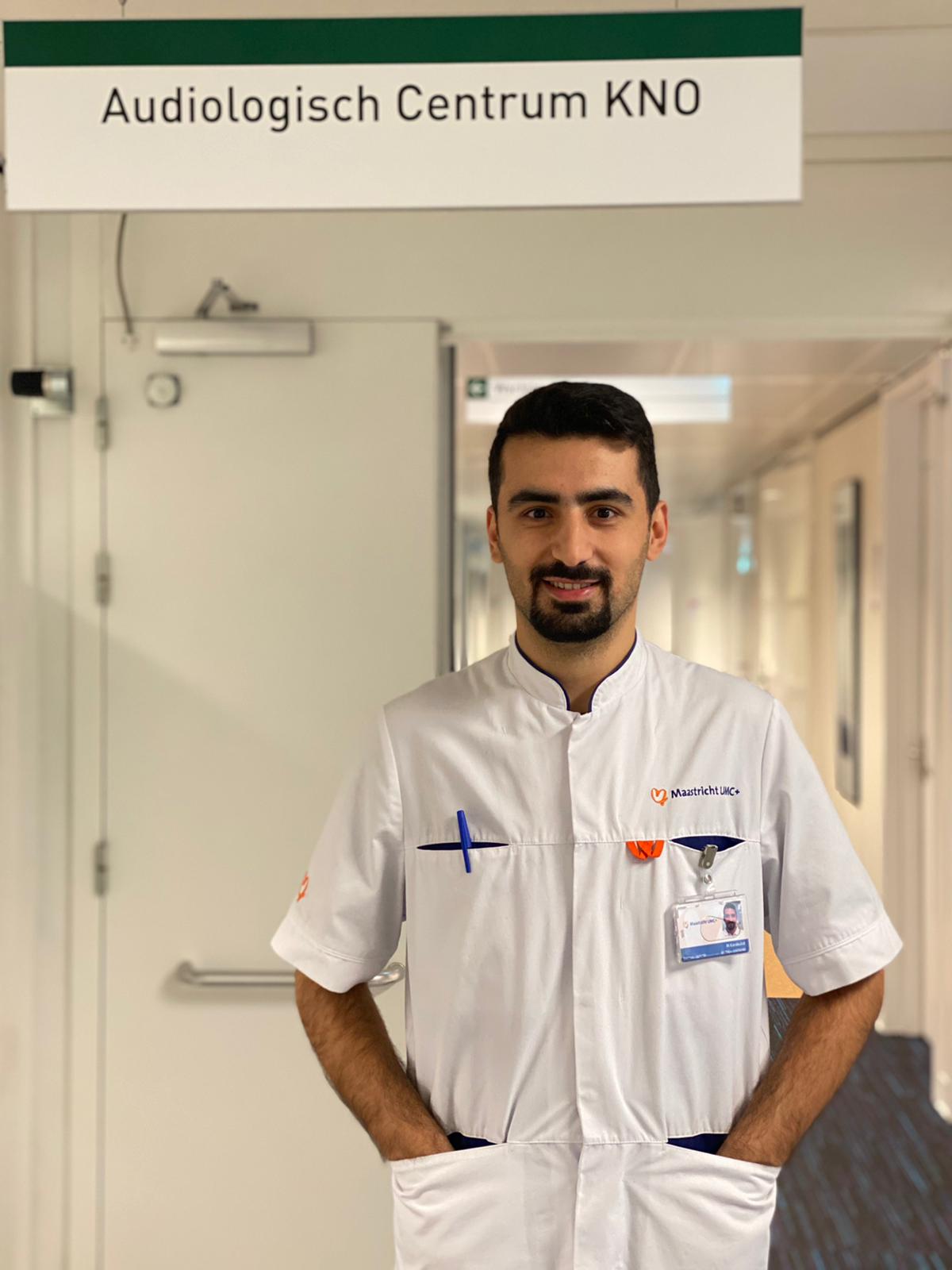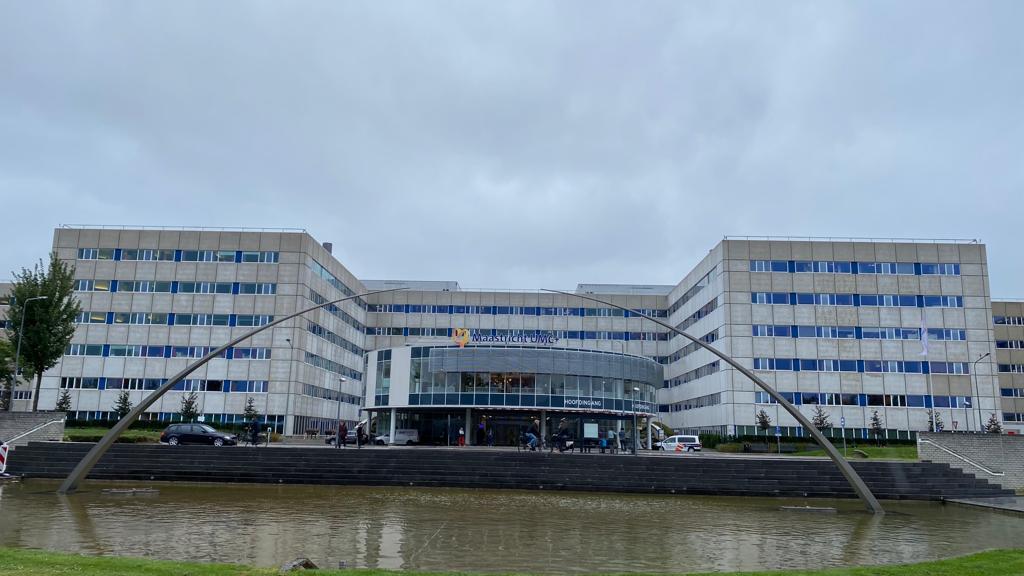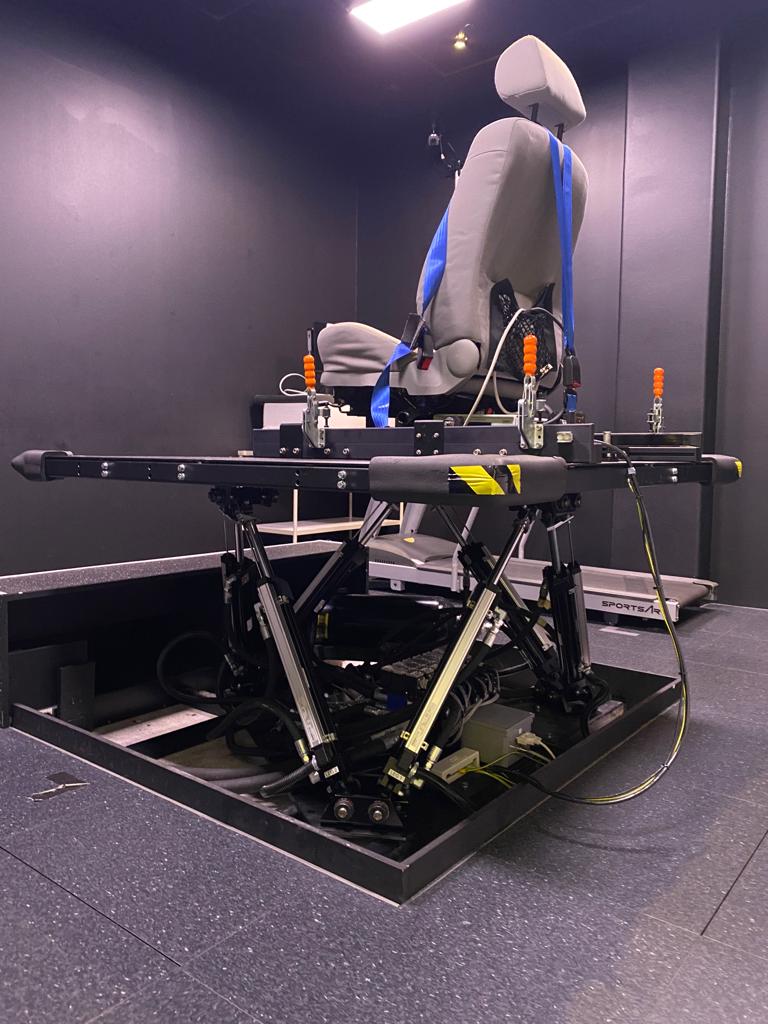Audiology Interview Series #1 Mustafa KARABULUT | University of Maastricht

Hi everyone, I’m starting a new series with this interview. I hope it will be very beneficial for everyone interested in Audiology. Thank you for your time and attention in advance. Enjoy!
PS: If you have a question about himself, please comment below. You will get an answer:)
Then, let’s start..!
- Can you introduce yourself?
I am Mustafa Karabulut. I have been doing my PhD, department of Ear-Nose-Throat at Maastricht University. I am a scholarship student on behalf of the Turkish government, with the scope of 1416 law belonging to the Turkish Ministry of National Education. Currently, my study specifically focuses on vestibular implantation, which has been started to be researched approximately two decades ago. At the same time, I am studying with a specific patient group called unilateral vestibular hypofunction. The reason why I am particularly working with this group is that those can have a possibility to be implanted in the future as well.
- How did you meet with Audiology? Can you give us information about your bachelor’s degree?
I had not known anything about Audiology before my father showed me that there is a major called Audiology in Turkey. Thanks to my father, he pioneered me to search for this profession. We thought it would be a huge opportunity for me regarding the job opportunities after graduation as no students have graduated yet. As a result of the second selection process, according to our exam point, I entitled to study Audiology at Hacettepe University. During my four-year bachelor’s degree, I took numerous courses 4-year bachelor’s degree such as clinical audiology, electrophysiological evaluation, central auditory processing, vestibular evaluation, management, treatment procedures, etc. At the end of the last year, after observing different areas in the audiology during the clinical observation, I decided to continue my career with vestibular system evaluation, management, and treatment.
- How did you start your PhD education abroad? What steps did you take until now?
I think those were a quite long process. Before beginning the scholarship programme, I was first assigned to Kastamonu state hospital as an audiologist. After which, I worked approximately three years at Ankara Yıldırım Beyazıt University as a research assistant. Then, I came across the scholarship programme, in my opinion, was a big chance to keep my career abroad. When it comes to all processes that I have exposed, you usually can find all the necessary information on the official website of the Turkish Ministry of National Education. Still, briefly, I will explain all the necessary process with items as follow:
- Application to the scholarship: To apply to this scholarship programme, you must first have a bachelor’s degree. It is important to emphasize that your GPA point of your bachelor’s degree might determine whether you will be entitled to have a scholarship because total points are generally quite close to each other, and after a comma of the total points can determine who will deserve it. Secondly, you must have an ALES exam point that must be valid for at least five years.
- Interview: If you are deserved to join the interview, you will be informed from the website. During the interview process, you will see at least two distinguished lecturers relevant to your area and one relevant person from the Turkish Ministry of National Education. For the latter, you will be exposed to several essential questions: Why do you prefer this scholarship? What is your purpose when you start this process? When you come back here, what are you going to do? Why are we selecting you? etc. As you can predict, the lecturers ask for some questions about your interest area.
- Results: After the calculation process (%40 ALES exam point, %40 Interview, %20 GPA), You will be informed from the website whether you deserve this scholarship.
- English proficiency and requirements: There are some requirements that all selected scholarship students must comply with. One of them is English proficiency. There are different types of English proficiency exams you can apply to. Usually, the students prefer to take either IELTS or TOEFL. You need to take at least 6.0 points from IELTS or 69 points from the TOELF exam to start acceptance procedures from the universities. Some exceptions can occur, but it is essential to make sure that you meet the stringent criteria that the Turkish government provides the students.
- Furthermore, the English proficiency of the universities in different countries and even in the same countries can show variability. In this way, it can also be possible that you can have unconditional acceptance. That means that you are asked to complete English proficiency requirement points in a certain amount of time that the university provides you.
- Acceptance procedures: As far as I know, it is enough to take an English exam point during the application to the master’s degree. All you want to do is just contact a person associated with administrative staff in the relevant university. In contrast, during PhD application, you need to prepare a research proposal explaining what you will do during your PhD life. Besides, it would help if you prepared your CV, which is extremely important for your prospective supervisor to see whether this student is eligible for the programme. If you can receive positive feedback, then your prospective promotor can ask you to arrange a virtual meeting to discuss your research proposal in detail. Finally, you are getting an acceptance!!
- What did you pay attention to when choosing a university and research field for your PhD education?
Actually, I have already decided what I will do during my education since I graduated with a bachelor’s degree. So, I always thought that I was going to study vestibular medicine. Regarding the universities, the first choice that I was thinking of was always the universities that give the education in English. Therefore, I was first interested in universities in the UK. However, since I did not receive any positive or negative feedback and had quite a limited time to accept, I had to change my focusing point to the Netherlands. I chose Maastricht University because, as I mentioned before, the study area of vestibular implantation is only applied in five centres worldwide. One of them is Maastricht University. Lastly, I aim to obtain all the information about this topic and to bring it back to Turkey.
- What challenges did you face before starting the PhD education? How did you deal with that issues?
Before beginning to PhD, generally, I had difficulties with the administrative process as you may also know that there are a lot of steps that you must do. On the other hand, one of the biggest challenges was the language. That’s why within the scope of the scholarship programme, I got an opportunity to have English education in the USA for six months. I believe that I improved my English during the six months. After which, when I came to the Netherlands, I told myself that I was so glad that I went to the USA. The only way to cope with your issues is to expose them and face them out. Do not give up, do not run away from your problems!
- What kinds of pros and cons have been doing a PhD in the Netherlands?
I think the number of advantages of doing PhD in the Netherlands surpass the number of drawbacks.
- Learning how to perform research.
- Administrative the research with a team working.
- Criticize the studies that have been performed until now instead of presenting them.
- Chance to discuss any topic with a group of people working on the same subject.
The only thing that I have seen as a drawback up to now has been the clinical procedures. While evaluating the patients in our clinic, the interaction between the clinician/research and patient has been only done in Dutch. So, maybe this can be turned into an advantage by learning a new language.
- How is going your PhD education, and can you tell us information about the meetings?
Up to now, I just wrote one chapter about vestibular implantation present status and prospects. Currently, I am doing the second study, which is a systematic review of unilateral vestibular hypofunction. What is really nice thing is that we have already planned what will be performed during all PhD life. There will also be a retrospective review and prospective studies in the group of patients with unilateral vestibular hypofunction. Regarding the meetings, it can change. I try to regularly arrange our sessions with my supervisor once in two weeks. To be honest, if you do not have any questions, you do not have to do it. We will also start regular meetings with all PhD students working on vestibular implantation in the following months. I think this is crucial because as long as we can share our research process, every person can stay updated.
- Can you talk about your routine, social activities and relationships?
Apparently, I only work during weekdays from Monday to Friday. Sometimes, certain pieces of stuff may not be completed on time; however, if I do not take my time, I am not able to get benefit from my studies. Therefore, I just try to chill during the weekends. I am also taking a Dutch course from Maastricht University and an academic writing course from Turkey virtually. So, for me, these days are quite busy. Concerning my social life, I also try to learn Kizomba and Salsa dance which really makes me feel better. There are a lot of students who come from different countries, and becoming one of the members of this international environment is also fantastic.
- Can you talk about your research proposal? Do you satisfied with the subject you have been working?
My study area is vestibular implantation which is a quite novel area in vestibular medicine. Briefly, this is an artificial balance organ. Head motion is captured by the gyroscopes/accelerometers. This head motion information is transferred to electrical signals by the external processor. These electrical signals are then conveyed to the ampullary branches of the vestibular nerves incorporating with vestibular electrodes via implanted stimulator. By regulating the firing rate/amplitude of the vestibular nerves, this information is perceived as head motion by the central nervous system. Therefore, the vestibular function can artificially be restored. This application is just applied for patients with bilateral vestibular hypofunction. Before coming up with this idea, many treatment options such as medication, balance training, vestibular rehabilitation procedures (adaptation, habituation, sensory substitution) have been applied and studied in patients with bilateral vestibular hypofunction. However, those applications have just provided a low yield in this group. Currently, there is, unfortunately, no adequate treatment option that can restore vestibular function. Therefore, based on the growing success of cochlear implantation and promising results obtained from animal studies, the concept of vestibular implantation has been arisen. I am delighted to study this topic as it is quite new, open to research, and worth struggling with!
- What are the differences between Turkey and the Netherlands in the clinical and academic?
Since I am a researcher right now, I will give you some aspects about the differences between both counties. In Turkey, the process of ethical approval application is quite basic. I am trying to say that all you need to do is write down all the methodology sections elaborately. At first sight, it looks good. However, the main issue is that there is no control mechanism. When you have positive feedback from the ethical committee, the process is generally completed. But I think it needs to be kept in mind that some procedures should be considered, such as auditing, monitoring, in case of severe adverse effects, side effects, data management procedures, etc. Every research should be checked via a group of people required to be assigned by an ethical committee regularly. I mean at least 6-month duration, auditing and monitoring should be performed. There should also be added some new sections in the ethical approval document. For example, if any side effects or serious adverse effects on the patient, which application or regulation/legislation procedures must be implemented? Data collection, management, and protection procedures should also be explained—secondly, the writing process as far as I have observed that 80% of professors working in the universities are unfortunately writing their manuscript Turkish as first. Then, they are trying to find some companies to be translated their manuscript to English. The English language needs to take more place in our daily life. I think that especially master and PhD education should be transferred in English instead of Turkish. The most important is the dissertation stage. I believe that the dissertations should be written and presented in English. In this way, we will be able to dominate the English language.
- What are the qualifications to conduct a PhD research? How do you improve yourself?
I will respond to this question by providing some items.
- To be enthusiastic about doing research.
- Open-minded to learn something new.
- To pursue the literature relevant to your interest area.
- Being an independent researcher.
I think those items explain what the requirements are for doing a PhD. Besides, you have to devote a large part of your life to your studies. You have to show dedication. Most importantly, you have to be a planned-scheduled person. Otherwise, you will probably not be able to catch up on every single stuff you have to perform during your PhD life.
- Do you have any recommendations for students who want to proceed with MSc or PhD?
I think the first stage should be whether you really want to do it. If you are really keen on doing it, do not surrender yourself to something/someone. Run after your dreams. If you have already determined individuals to do it, you will somehow obtain what you wish without hesitation. Regarding the question, the number of graduated students in the Audiology department has still been increasing. So, it would be best if you had a plan of what you wanted to do first. There are many stages, such as the ALES exam, English proficiency exam. You need to have the highest point as much as you can from these exams. For your knowledge about your interest area, you need to determine what you specifically want to study. After that, dominate the literature. Read scientific studies and keep updated the conferences, congresses, scientific organizations. Try to pursue these organizations on official websites such as LinkedIn. As I told you, I will say once again that the only way to be successful in your area is to be an alert and endeavour person.
See you in the following interview! We are waiting for your contributions and comments!











